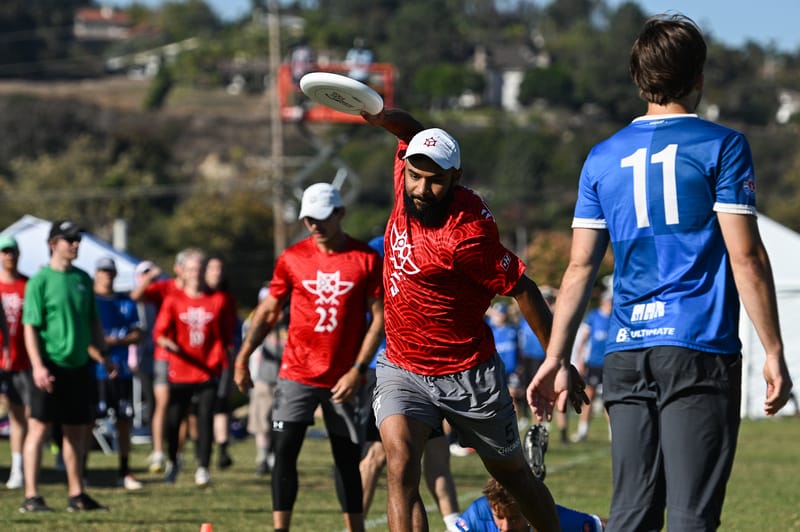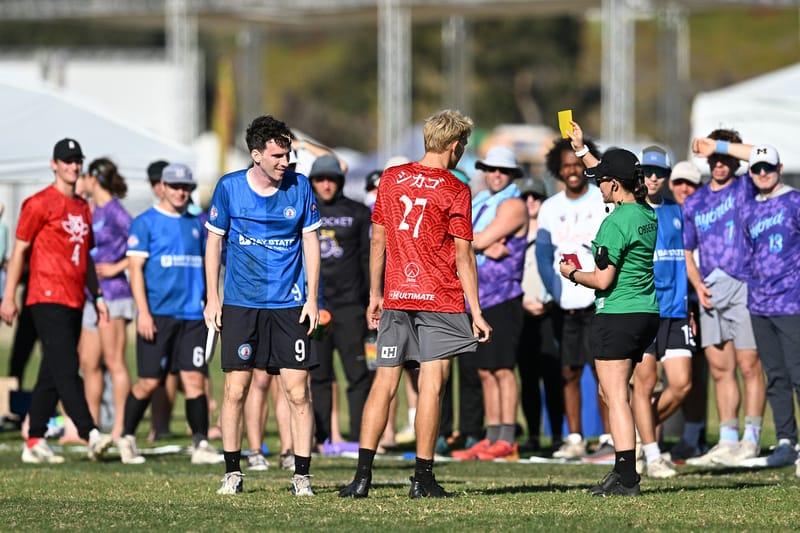Chicago claw past Boston to make second-straight semifinal
October 26, 2024 by Edward Stephens in Recap with 0 comments

Ultiworld’s coverage of the 2024 Club Championships is presented by Spin Ultimate; all opinions are those of the author(s). Find out how Spin can get you, and your team, looking your best this season.
In one of the most compelling games of the tournament so far, a short-handed #2 Chicago Machine out-muscled a game #3 Boston DiG to advance to semis for the second season in a row. The 13-11 was a physical battle, a tactical drama, and, thanks to a pair of yellow cards resulting in an ejection for star first-year Machinist Daan De Marrée, a conversation piece.
Playing without Joe White and John Lithio as part of a rash of knee injuries afflicting the team in recent weeks, the Machine O-line blinked first. Johnny Bansfield missed a forehand to give away the possession, and DiG placed their counter in the hands of Ned Dick, Jeff Babbitt, Noah Backer, and Brendan McCann. That quartet ran a dominator set that Machine’s O-line couldn’t touch and put in the break to take a 4-2 lead.
Both defenses set a physical tone early. It was rough but good-natured and essentially fair. “It was a physical game,” said Machine’s Nate Goff.
The contact-heavy mood hit the peak of its first act in what seemed like an almost comical moment when De Marrée, chasing Belgium Open teammate (and European club rival) Tobe Decraene, left his feet to land on top of Decraene completely. The yellow card De Marrée subsequently earned, easy enough to laugh off in the moment as a bit of horseplay from two transatlantic transfers getting out their jollies in their biggest game of North American club, would prove consequential later in the game.
DiG’s offense had been confident, but not clinical, to start. While they had shown their strengths – Calvin Stoughton cutting in isolation from the front of the stack, Rowan McDonnell’s hucks and unconventional short throw angles, the ability of Decraene and Peter Boerth to turn on the burners for a deep run – they had also shown the disc to Machine a handful of times. It was no surprise that, given so many chances, Machine got the break back before halftime.
With Machine trailing 7-6, Goff’s handblock on Solomon Rueschemeyer-Bailey fizzled out in another missed break opportunity. A second DiG turnover turned out to be more fruitful. Bansfield flung a huge backhand to the end zone for De Marrée for the break to put the game on serve. But Machine weren’t done yet. Kyle Rutledge knocked a way an uncharacteristically sloppy Dick backhand, and Machine had another break opportunity from midfield. A herculean bid from McDonnell attempting take the disc away came up just short and gave De Marrée an unmarked look at Goff to take half.
Machine’s one-break advantage was slim. The attitude on both sides, however, somewhere in the sweet spot between chirpy and cocky, was growing by the minute. De Marrée stared down Tyler Chan after catching an open side goal in Machine’s red zone set. McDonnell, ever a wily operator, faked out the entire Machine defense with a hammer grip just outside the end zone; they all looked crossfield for targets to guard. The diversion gave him an opportunity to reach a completely free Simon Carapella a mere yard ahead of him.
DiG put the game back on serve quickly when a Machine execution error gave them a chance to use one of their best weapons: Orion Cable. Cable’s combination of size and air ability have been nigh-unanswerable for opponents this season. Backer wasted no time putting a disc high into the end zone for him – Keegan North, who had picked Cable up in transition, judging the flight of the disc and the obvious size mismatch, didn’t even try to contest it.
As intense as the game had been up until DiG evened the score at 9-9, for the closing handful of points it found a higher pitch that carried through to the end. A thrilling point began with a huck that hung for Goff above the end zone – and also above the imposing figures of Gus Haflin and Babbitt, two of DiG’s top defenders. Unlike most matchups that Haflin and Babbitt have to stop, Goff’s size meant that it would be a fair fight for the disc. Still, it was two-on-one, advantage DiG. Goff, though, powered up a vertical that would make most basketball players blush, taking the disc well over both defenders’ heads. While he was airborne and making a play for the disc, though, Babbitt’s shoulder made contact with him, and Goff was unable to hang onto the catch before tumbling back down to earth.
To say Goff got the disc back in spectacular fashion would be a gross understatement. A huck went up to Babbitt in the back corner of the other end zone. Goff, trailing, made up the ground and flew, swiping at the disc above Babbitt’s head while fully horizontal to get the block.
Goff was matter-of-fact when describing the play after the game. “I got a good chance where I saw the throw coming because it was a high stall, and you know they’re gonna look to [Babbitt] in that situation. And then he had to think about toeing the back line, and I didn’t. So.”
The teams traded turns again, and then De Marrée showed off his tremendous maximum effort footspeed to beat the deep defender and chase down a huck that would have been out of reach for almost anybody else at the tournament. He launched into a massive layout catch to set up Machine’s hold.
The teams held the line for two more eventful points – one of which included a field position penalty as Machine earned their third yellow card of the game – before Chicago found the game’s next break. It came after a DiG overthrow of Decraene, who nearly matched De Marrée’s magnificent catch with a full-send bid of his own. Bansfield controlled the counter, and stole the disc from just ahead of another Decraene bid as he skipped into the end zone to finish the final five-yard connection of the 70-yard break drive.
Cap had gone on during the point, leaving Machine in very good position to take the game. They had a 12-10 lead in a game to 13. What could go wrong?
That typically rhetorical question had a practical answer this time around. It turns out that what could go wrong is that for the second year in a row one of their best players might be barred from competing in the first half of their next game.
DiG had pushed to midfield in their attempt to stay in the game. Rueschemeyer-Bailey saw an opportunity for free positive yardage on a bump pass, and trotted out to catch the throw floated for him in clear air near the backhand sideline. De Marrée had been defending just in front of DiG’s backfield duo, but away from the direction of that throw. He hurried to the spot – late. Rueschemeyer-Bailey had already caught the disc and reached a stationary position when De Marrée entered the play. De Marrée couldn’t stop, and he hit Rueschemeyer-Bailey hard. It was a clear yellow-worthy play.
It carried much greater consequences than a typical yellow card, though, because it was De Marrée’s second and the team’s fourth. From a team perspective, it gave DiG possession of the disc at the attacking brick, from which point they held easily on a long slashing cut across the goal line by Stoughton to stay within a goal.1 De Marrée was ejected from the point, the game, and, because the ejection happened in the second half, the first half of his next game, too. Because Machine ended up winning, he will serve that penalty during the first half of their semifinal.

“You know, it’s unfortunate,” said Goff. “Now we’re gonna miss our absolute star in the first half of the next one… [De Marrée is] incredible. Absolutely an incredible player. Always open. Always does the right thing. Endless motor.”
With De Marrée unavailable, a different international player took over for Machine on their final point. Malik Auger-Semmar, the Team Canada star in his second year with Chicago, drew gasps from the sidelines as he saved the possession with a stunning grab. A few throws later, he shimmied downfield to the backhand sideline and into a free space to score the winning goal.
Machine will face #9 Portland Rhino Slam! in semis – sans De Marrée for the first half. That is worrisome in one sense: you can make the argument that he has been the team’s best player this weekend. But if any there is any team unlikely to be knocked off course by such a twist of fate, it’s Machine. Just last year, they endured the same fate when Johnny Bansfield was given a red card late in the second half of their semifinal and had to sit out the first half of the championship game. Furthermore, this kind of wrinkle has been the norm for a club whose tournament has not gone at all to plan.
“Nothing this weekend has gone exactly the way we planned,” said Goff. “Our leadership meetings have been a little chaotic in that way. It’s obviously a huge loss… but we’re going to have a good game plan, and we’re gonna start strong.”
A fifth team yellow card, which did not occur, would have resulted in an automatic forfeit. ↩